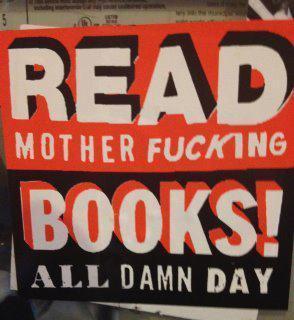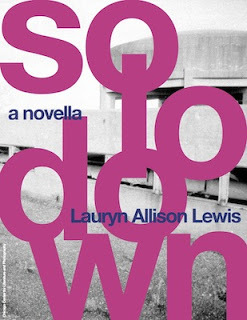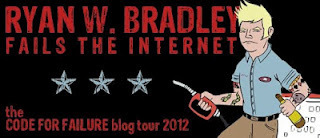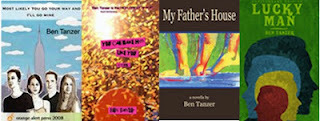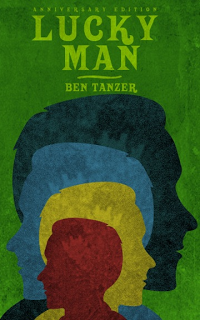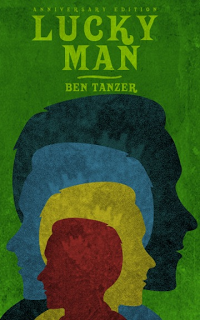Ben Tanzer's Blog, page 153
March 22, 2012
Indeed.
Published on March 22, 2012 16:12
March 21, 2012
This Book - and Podcast - Will Change Your Life - Code for Failure by Ryan W. Bradley.
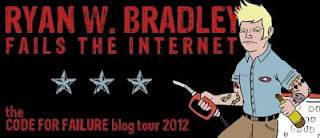 We suppose we could pretend we are unbiased when it comes to Code for Failure, Ryan W. Bradley or even the Ryan W. Bradley Fails The Internet blog tour which is being hosted by the endlessly terrific TNBBC's The Next Best Book Blog. But why bother, we love them all, we are fanboy and when these things crash together in a morass of literary awesomeness, we say beautiful, all of it, this is the goodness that serves as our fuel and the point of building this faux empire, being involved with things we love, reading, blogging, podcasting, authors, indy everything. So yes to all of it, yo, and no, we have not dropped our yo mode quite yet. Still, all of this said, Code for Failure is a wonderful thing, a meditation on the idea that even when you're mostly joyful, or even quasi-joyful, mistakes will be made, and failure will loom, until we believe happiness and success, however, we define these things, are really possible and available to us. And yes, maybe that means that Ryan W. Bradley is the punk Seuss, but then so be it, that's beautiful as well. Now, onto the business at hand, please do hit the podcast, please do enjoy some book blurb below, and because this an official book tour stop, please do plan to hit tomorrow's stop at Dead End Follies as well.
We suppose we could pretend we are unbiased when it comes to Code for Failure, Ryan W. Bradley or even the Ryan W. Bradley Fails The Internet blog tour which is being hosted by the endlessly terrific TNBBC's The Next Best Book Blog. But why bother, we love them all, we are fanboy and when these things crash together in a morass of literary awesomeness, we say beautiful, all of it, this is the goodness that serves as our fuel and the point of building this faux empire, being involved with things we love, reading, blogging, podcasting, authors, indy everything. So yes to all of it, yo, and no, we have not dropped our yo mode quite yet. Still, all of this said, Code for Failure is a wonderful thing, a meditation on the idea that even when you're mostly joyful, or even quasi-joyful, mistakes will be made, and failure will loom, until we believe happiness and success, however, we define these things, are really possible and available to us. And yes, maybe that means that Ryan W. Bradley is the punk Seuss, but then so be it, that's beautiful as well. Now, onto the business at hand, please do hit the podcast, please do enjoy some book blurb below, and because this an official book tour stop, please do plan to hit tomorrow's stop at Dead End Follies as well."As I consumed Code for Failure at first full of joy, then dread, then joy again, I couldn't help but think about the last time I tried to join the Century Club. To join you need to drink one shot of beer per minute for 100 minutes. At first there is humor and ease, the beer flows, you catch your breath, and dive back in. But then the minutes come at you faster and faster, things go wrong, beer is spilled, you lose your confidence, and a sense of anxiety begins to creep into the proceedings. At some point though you remember that this is supposed to be fun, that you can enjoy the moment and that you can stop being so wrapped-up in your fears and confusion. And that I think is Code for Failure, an exploration, even explanation, for how life can be so potentially full of pleasure and self-absorption, and how all is fine until mistakes are made, and mistakes will be made, and when they are, the hole will deepen, and you will not be sure that you can find your way out, until you do, because you will. And yes, I know I sound like I'm getting all Seuss and riffing on the punky, drunken, tattooed version of Oh, The Places You'll Go!, but that's okay, because that's what Ryan W. Bradley knows so well, and captures so vividly, life unfolding in real time, decisions made and not, love and loss, and the idea that failure is always looming until we are willing to believe in ourselves, take chances and remember that it's okay to be happy again."
Published on March 21, 2012 10:11
March 20, 2012
There is new CCLaP. It is So Down. So Lauryn Allison Lewis. And so totally pre-order.
Published on March 20, 2012 16:22
March 18, 2012
March 17, 2012
This Book Will Change Your Life - Broken Piano for President by Patrick Wensink.
 The Wensink. Where to start? Lives in Kentucky. Which seems important. Daddy-cool. Definitely important. Author of quasi-bizzaro, near punk literature. Intriguingly important. Which we hope is important, and a real word, though is definitely important to us regardless. And we say this because we want to somehow capture what its like to find yourself caught up in a new author, who writes in a genre, you might not neccessarily read, and cranks out books you might not have necessarily encountered, but now you do, and have, and it feels like a discovery of sorts, something new you want to own. Sometimes that author is well along the way in their career and you pick through their work, seeking out themes, and highlights, which for you is exciting and fresh, and other times, they are new and fresh and finding their voice, and the Wensink falls in the latter category, and this too can be exciting, because you see the voice taking form, emerging and happening right in front of you. Which brings us to Broken Piano for President and the blurb we were most honored to provide and have only slightly altered here for your life-changing consumption.
The Wensink. Where to start? Lives in Kentucky. Which seems important. Daddy-cool. Definitely important. Author of quasi-bizzaro, near punk literature. Intriguingly important. Which we hope is important, and a real word, though is definitely important to us regardless. And we say this because we want to somehow capture what its like to find yourself caught up in a new author, who writes in a genre, you might not neccessarily read, and cranks out books you might not have necessarily encountered, but now you do, and have, and it feels like a discovery of sorts, something new you want to own. Sometimes that author is well along the way in their career and you pick through their work, seeking out themes, and highlights, which for you is exciting and fresh, and other times, they are new and fresh and finding their voice, and the Wensink falls in the latter category, and this too can be exciting, because you see the voice taking form, emerging and happening right in front of you. Which brings us to Broken Piano for President and the blurb we were most honored to provide and have only slightly altered here for your life-changing consumption."The last time we drank with Hemingway, wait sorry, it was not Hemingway, it was Jackie Collins. Anyway, the last time we drank with Jackie Collins she said to us that writing is not like dating in that when you write you have to commit. Every sentence. Every pause. Every juke, joke and feint has to mean something. This is especially true with absurdist writing, because what's on the page is not what you know to be right. Which doesn't make it wrong. Just warped. And different. Which is a good way to describe the endlessly fertile mind of Patrick Wensink. Warped. And different. In a good way certainly. We think. Maybe. Regardless, he commits to his stories and his vision of the world, from book to book and breath and breath, and with Broken Piano for President he not only continues to break fresh Wensinkian ground, he continues to find his voice, a warped voice surely, but one uniquely his own. And yes, we just dropped the phrase Wensinkian there, which we now here by officially claim as our own. Trademark pending of course. And Pat Riley be damned."
Published on March 17, 2012 18:17
March 16, 2012
We are Connotation Press. And Darger.
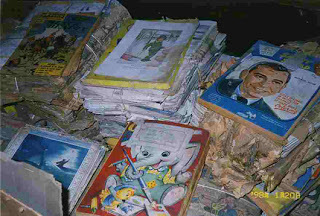 We are also much appreciative. There is new interview. And new piece, "Mass," a riff on Henry Darger. Big thanks to the Connotation Press and the endlessly awesome Meg Tuite. Now, how about some excerpt? Cool.
We are also much appreciative. There is new interview. And new piece, "Mass," a riff on Henry Darger. Big thanks to the Connotation Press and the endlessly awesome Meg Tuite. Now, how about some excerpt? Cool. "I loved this story, Mass. At first, I'm reading this exceptional inner dialogue of this magnificent OCD character. His every move must be methodical or the next move cannot happen.
"You make coffee. There can be no spilled grounds, grounds bring ants, ants bring pestilence and pestilence brings death. You drink your coffee, one cup, no milk, no sugar. If the coffee spills you start again. You make toast, one piece, butter, no jam, never jam, jam brings ants, ants bring pestilence and pestilence brings death."
Then, as I'm reading on, I am sure that you have drawn an incredibly moving picture of a day in the life of Henry Darger. I saw the documentary on his life and was mesmerized by him. No question, the story of Henry's life is inspirational, but how did you come to write this beautifully poetic and disturbing piece.
"You go to Mass. You absorb the words as they float across the pews, taking flight, changing shape, and color, nuanced and beautiful and bending in and around the light. You do not think about the asylum. You take this time to kill all thoughts of self-abuse, or pleasure. There can be no release of any kind until you are home again."
First off, thank you for the invitation to submit a story, the kind words and your interest in doing an interview. And second, I had this story "I Am Richard Simmons" published by ML Press a couple of years ago and I initially thought it might be cool to try and write some similar pieces in that vein, first-person ruminations on obscure or somewhat inscrutable quasi-celebrities we think we know something about and how they cope with confusion, pain and their inability to wholly communicate what they struggle with. I didn't pursue the idea because I was concerned that I wouldn't be able to capture the tone and vibe I had with that piece. More recently though I started thinking about this again and for a month or so just wrote down the names of people who I thought might fit what I was going for, including Henry Darger, who I have been alternately fascinated and repulsed by for years. I am also fascinated and repulsed by OCD and the crippling nature of it in the extreme is endlessly upsetting to me. The week you asked me to submit something, was also the week you interviewed Gregory Sherl, who simultaneously had an essay being run by the Good Men Project. I am a fan of his, and I find myself very absorbed with how he both writes and talks about himself whether in his work or on social media and the ways he copes with and is controlled by his battles with OCD. As I read about Gregory that week, the possibilities of Darger as a character became infinitely clearer to me, a man who is controlled by his OCD, but who also treats his OCD as a tool to protect and mold his creative vision. I didn't want to romanticize this, nor do I frankly know anything really about Darger, but that's part of my goal with these pieces. They're my impressions and reactions to people we think we sort of know, but don't, and can't, and if they turn out poetic or beautiful, I'm thrilled, that's really wonderful and humbling.
Published on March 16, 2012 15:17
March 15, 2012
Soon is now.
Published on March 15, 2012 17:19
March 14, 2012
This Book Will Change Your Life - Short Bus by Brian Allen Carr.
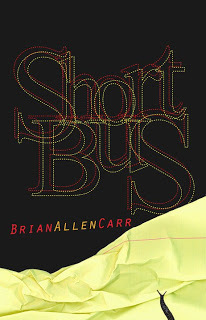 Such a nice surprise the Short Bus. We were familiar with the Carr as a champion of indie lit and writers, but not as familiar with his work. We might not have even read it, which is not stated in any pejorative sense, as much as a reflection of the masses of work out there we want to read, are asked to read and struggle to wade through. And nothing pejorative about that either. Too much too read will never be bad, and people actually wanting us to read things, just cool, dig it, appreciate it, and always wanted it. Which brings us back to the Short Bus all popping as it is with vivid imagery, damage and dislocation. We were thrilled, honored even, to be asked to review Short Bus for American Book Review. Which we did. Gladly. And with great enjoyment, if one can say they enjoy much of what happens in these stories. Whatever the accurate descriptor may be however, we hope you will check out the book and find a way to read the full review. We will also offer you some excerpt.
Such a nice surprise the Short Bus. We were familiar with the Carr as a champion of indie lit and writers, but not as familiar with his work. We might not have even read it, which is not stated in any pejorative sense, as much as a reflection of the masses of work out there we want to read, are asked to read and struggle to wade through. And nothing pejorative about that either. Too much too read will never be bad, and people actually wanting us to read things, just cool, dig it, appreciate it, and always wanted it. Which brings us back to the Short Bus all popping as it is with vivid imagery, damage and dislocation. We were thrilled, honored even, to be asked to review Short Bus for American Book Review. Which we did. Gladly. And with great enjoyment, if one can say they enjoy much of what happens in these stories. Whatever the accurate descriptor may be however, we hope you will check out the book and find a way to read the full review. We will also offer you some excerpt."Arguably, the stories in great collections hang together, they feel like there are of a piece, and one way they do this is by evoking a sense of time and place, What We Talk About When We Talk About Love by Raymond Carver for example, Drown by Junot Diaz or Big World by Mary Miller. We know these stories are from somewhere, and because of the writing, we accept that this somewhere is believable and makes sense, even if we don't know the Bronx or the Pacific Northwest based on any kind of personal experience.
Carr accomplishes this certainly, capturing the flavor, smell and taste of the border areas between Texas and Mexico, a place few of us actually know, but think we understand via some weird kind of magic courtesy of watching CNN and Robert Rodriguez movies. The richness of the area, and Carr's efforts to illuminate it is nicely exemplified in the following passage from the story Over the Border, "One thoroughfare with unpaved tributaries fanning toward barrios, dirtier and more dilapidated the further from Benito Juarez Avenue, the musical street, with buildings painted so bright, like Easter eggs in the sunshine… (Page 18)." [image error]
Published on March 14, 2012 19:40
March 13, 2012
This. So happening soon. Mass Lucky Man affections for ADP and the Ryan W. Bradley.
Published on March 13, 2012 20:49

